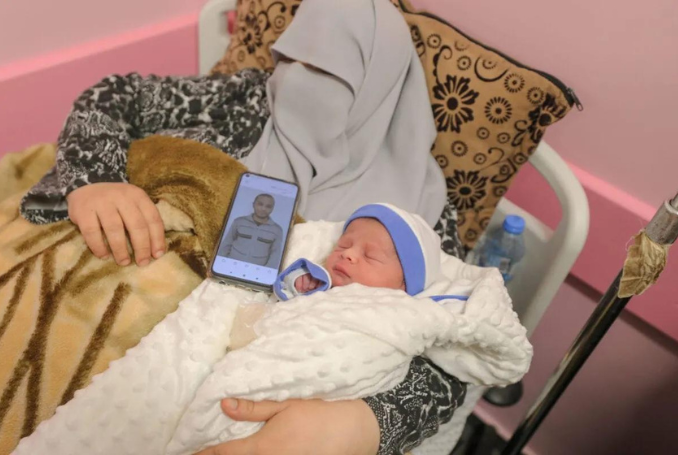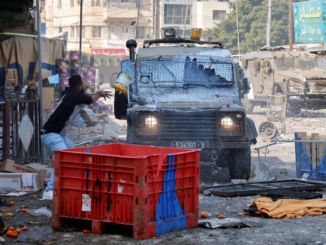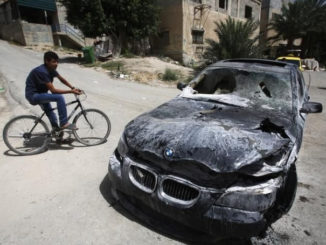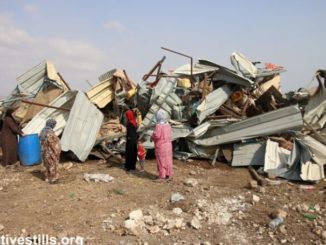
By Ahmed Dremly 
“Milad is a dream for Walid, for the detainees who hope to be fathers, and for the Palestinians who challenge injustice and deprivation without succumbing to despair.”
Walid Dakka, 59, is one of the oldest Palestinian detainees in Israeli jails. He was arrested in 1986 and sentenced to 38 years on charges related to a Resistance operation in 1985, in which an occupation soldier was captured and killed. During his time in prison, Dakka obtained a Master’s Degree in political science and published several novels and books on political theory. He also wrote a fictional story about a child named Milad who was born via sperm smuggled out of prison. Dakka’s story, however, ended up being even stranger than his own fiction ..
Dakka had married Sanaa Salama in 1999. The prison authorities imposed serious sanctions: He was placed in solitary confinement and Salama was barred from visiting for eight months. Despite years of asking to be alone with each other to conceive a baby, or for permission to donate sperm for artificial insemination, the Israeli courts continued to reject their requests. They came to believe that the only way for them to conceive was through sperm smuggling.
Salama began a long medical process of examinations and injections to become pregnant. When she visited her husband before her first examination, they agreed that if she were to become pregnant, she would bring Dakka’s brother to the visit, and if she were not, she would come alone.
“When I came into the visiting room with his brother, Waleed couldn’t stand to greet us. He started shaking and crying. I told him. ‘Your thoughts are right and here is your brother.’ The other detainees all hugged him. The visiting room was filled with crying and laughing,” Salama said. “Milad is a dream for Walid, for the detainees who hope to be fathers, and for the Palestinians who challenge injustice and deprivation without succumbing to despair.”
Dakka was kept in solitary confinement during birth. Salama announced that the Palestine TV channel would cover it. “This way, if we did not have the chance to call and reassure him,” she said, “the other detainees who had access to a TV would know the news and tell him.”
Milad Walid Dakka was born on March 2, 2022. For two years, Milad’s family struggled in Israeli courts to include her father’s name on her birth certificate. “They tried to give my baby the certificate without Walid’s name, but we didn’t stop until we won. They can’t deny the identity of Palestinian detainees’ children,” Salama confirmed.
This is not an isolated case. Ahmed Abu Aida is now 6. He is another child born via successfully smuggled sperm and intrauterine insemination. He is the son of Gazan detainee Mohammad Abu Eida, who was detained in 2004, after just seven months of marriage, and sentenced to 22 years in prison.
Eida’s wife, Walla Abu Aida, was prevented from visiting him in prison for over 2 years. “During the first visit after so long, I just kept looking at Mohammed, as he did at me, for the whole 45 minutes of the visiting time, without saying a word. The other detainees’ relatives, in the large visiting room, came over to comfort us,” Aida said.
Though Aida had the opportunity to join her family in Dubai, she chose to stay in Gaza and wait for her husband. They struggled together to have a child.
Having children via sperm smuggling is harder for women because of the timing and procedures required for intrauterine insemination. The couple tried three times. It didn’t work the first time. The second time was even worse. Aida became pregnant and gave birth to twin girls, but sadly, they died. “I suffered preeclampsia. I fell into a coma for a month after the birth, and my heart stopped for a while,” she told me. A very difficult time for both parents followed.
In 2016, they tried for the third time, and the procedure finally worked. When Aida told Eida that the insemination was successful and she was pregnant, she heard the happy shouts of all the detainees along with her husband. She was careful in all ways to protect her health and the health of the coming baby. Her parents again asked her to join them in Dubai where they live, but again she refused, because, she said, “I was worried about losing the fetus as a result of difficulties of travel in Gaza.”
Aida explained the difficulties of looking after a child while his father is away. “I want to give Ahmed every good thing in life, but I can’t even give him the simple right of being with his father,” she said. Six-year-old Ahmed understands where his father is and knows that he will be free in 2026.
“I love baba so much. I’m waiting for him to be here. I want to stay with him. I want to play with him,” he said innocently. Ahmed will join his mother for the first time when she visits his father at the end of this month. “Before this,” Aida said, “Mohammed and I were afraid of him coming into the jail. Now I’m still afraid, but he always asks to see his father.”
On December 7, 2022, Walid Dakka was diagnosed with leukemia. He had been ill for some time, a consequence of medical negligence, which is a routine practice of the Isreali occupation authorities. “I was afraid of losing him during the cruel and inhuman solitary confinement. It’s a gradual assassination,” Salama said. She went on, “Life’s pain doesn’t end, and patience does not end either, and neither does the certainty of freedom.” Inshallah.

– Ahmed Dremly is a Gaza-based journalist and a translator. His writings appear in We Are Not Numbers and Mondoweiss. WANN contributed this article to The Palestine Chronicle.







